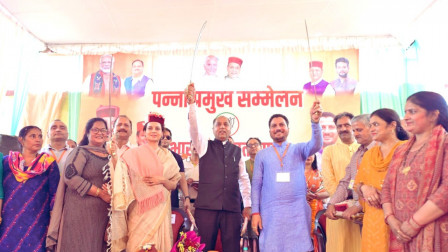
ANI
In a significant development, Karnataka has agreed to release 8,000 cusecs of Cauvery water to neighboring Tamil Nadu, each day. Rather than one TMC, to neighboring Tamil Nadu until the end of this month, according to Chief Minister Siddaramaiah on Sunday.
As instructed by the Cauvery Water Regulation Committee, the Karnataka government is prepared to provide 8,000 cusecs of water each day, rather than one TMC, to neighboring Tamil Nadu until the end of this month, according to Chief Minister Siddaramaiah on Sunday.
Historical Context of the Cauvery Water Dispute
The Cauvery water dispute is one of the oldest and most contentious water-sharing conflicts in India. The river Cauvery, which originates in Karnataka and flows through Tamil Nadu before emptying into the Bay of Bengal, is a crucial water source for both states. Disputes over its allocation have led to prolonged legal battles and strained relations between the two states.
Karnataka's Chief Minister announced the decision to release 8,000 cusecs of water following discussions with various stakeholders and legal advisors. The Chief Minister emphasized the need to balance the interests of Karnataka's farmers with the obligations to Tamil Nadu as mandated by the Supreme Court's directives and the Cauvery Water Management Authority.
The Tamil Nadu government welcomed Karnataka's decision, expressing relief and gratitude. Tamil Nadu's Chief Minister highlighted the importance of this release for farmers in the delta regions, who depend heavily on Cauvery water for irrigation. The move is expected to provide significant relief to the drought-affected areas and ensure the timely planting of crops. The release of 8,000 cusecs of water will have a profound impact on the agricultural sector in Tamil Nadu. The decision to release water also has significant legal and political implications.
The Cauvery water dispute has been a sensitive issue, with both states having strong political stakes. Karnataka's compliance with the water release order may help in de-escalating tensions and fostering better inter-state relations. However, it also poses a challenge for the Karnataka government to manage its water resources effectively.Karnataka has outlined several measures to ensure efficient water management and minimize any adverse impact on its farmers.
These include better irrigation practices, water conservation techniques, and the construction of additional reservoirs to store and regulate water. The government is also encouraging farmers to adopt less water-intensive crops and modern agricultural practices to cope with water scarcity.








Copyright © 2026 Top Indian News
